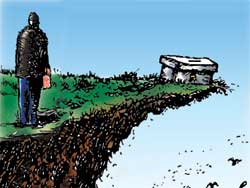 On the face of it, the sudden dissolution of parliament and the call for mid-term polls in November was just the latest outcome in the clash between Prime Minister Sher Bahadur Deuba and his nemesis within the ruling Nepali Congress, Girija Prasad Koirala.
On the face of it, the sudden dissolution of parliament and the call for mid-term polls in November was just the latest outcome in the clash between Prime Minister Sher Bahadur Deuba and his nemesis within the ruling Nepali Congress, Girija Prasad Koirala. But there seems to be more here than meets the eye. Koirala has tried to portray this as an epic battle between democrats and demagogues, and he calls Deuba a dangerous deviant who is intent on handing over the reigns to a palace-army combine. Deuba's supporters see Koirala as an ambitious dictator not satisfied with just being party president, and wants to be prime minister again.
Pressure had been building up among Koirala's cronies for a final showdown, and the sight of Deuba being feted at the White House and 10 Downing St earlier this month seems to have been too much to bear. The quarrel erupted as soon as Deuba got back.
Deuba was cornered, and ran out of options. On the one hand, the army brass was insistent that it needed a state of emergency for its counter-insurgency operations, and on the other his Congress rivals and the leftist opposition saw an extension of the emergency as a path towards martial rule.
In the end, the party had to do what it had to do: it suspended Deuba's party membership and Koirala asked the remaining members of hisjumbo cabinet to resign. But Deuba has also got what he wanted: another six months as prime minister whether or not he holds the elections as scheduled on 13 November. Furthermore, with parliament dissolved, the army can get a new three-month emergency without much of a fuss.
It appears to have taken Deuba less than three hours to formalise the decision to go for elections. Technically that would have involved a cabinet meeting to make a recommendation to King Gyanendra, rushing the paperwork to the palace for the royal seal-all in time for the 11pm newscast on Radio Nepal.
What has surprised many insiders is not so much that the decision was taken, but the speed at which it was done. And the entire process was so hush-hush that even Deuba's close cabinet colleagues were not taken into confidence.
"He may have had this option in mind, but because of its very nature only very close supporters were told," a Deuba aide told us. By press time Thursday evening resignations had come from Finance Minister Ram Sharan Mahat, Education Minister Amod Upadhyay and Women and Social Welfare Minister Rajendra Kharel.
Mahat told reporters: "I don't think elections can be held, and the political situation will be very uncertain." Kharel, once a staunch Deuba supporter, said: "We have doubts about the future of democracy itself."
Meanwhile, the main opposition was in a huddle all day. The UML standing committee saw this as a result of Congress infighting, and said it hadn't yet decided whether to accept the elections. The unlikely allies in this are Koirala and UML leader Madhav Prasad Nepal, brought together by their common suspicions about Deuba's anti-democratic motives. Political analysts see several scenarios till November.
. Congress sacks Deuba and his supporters, and Deuba formalises a split.
. UML goes into elections allied with the rump Congress under Koirala under a pro-democracy platform.
. A compact caretaker government announces an extension of the emergency, restricting campaigning by opponents to pull off a Musharraf-type poll.
. Maoists try to muddy the waters by allying with anti-Deuba forces to further their republican agenda while escalating the level of violence before elections.
All scenarios point to one outcome: more instability in the country.
On return from his US-UK trip, Deuba invited the police and army brass to an all-party meeting. According to sources present, Chief of Army Staff Prajwalla S Rana told party leaders that the emergency extension was needed to keep up the momentum against the Maoists and without it, there might be setbacks. On Wednesday he told the Nepali daily, Himalaya Times, "The Royal Nepal Army does not get into politics, it only responds to the national interest. We will first let the politics play itself out."
The Congress won a majority in May 1999. But infighting brought the average life expectancy of a prime minister to less than a year. Deuba came to office in July 2001, as the third Congress prime minister since May 1999. His government was the 12th in 12 years.


